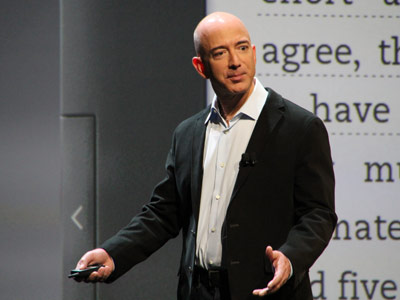5 questions about the Amazon smartphone
 Amazon is preparing a “mid-end” smartphone that could launch by the end of next year, Citi analyst Mark Mahaney reported today, citing work by colleague Kevin Chang.
Amazon is preparing a “mid-end” smartphone that could launch by the end of next year, Citi analyst Mark Mahaney reported today, citing work by colleague Kevin Chang.
Assuming this is true, it’s easy to understand why Amazon would want to do this: The smartphone market is massive (hundreds of millions of devices per year) and growing, and Amazon is building a nice stack of software and content services for its various devices.
Meanwhile, some questions:
- Is Amazon building just another smartphone? Or will it try to do something more ambitious and disruptive here? That could potentially include offering data-only service with no minimum voice subscription required, re-selling wireless service under its own brand, doing cheap pre-paid service, or building a multi-carrier phone where carriers compete for your business with special offers and market-based pricing. These are risky ideas, but they may be rewarding.
- Will Amazon sell this phone only direct-to-consumer, via its website? Or will it sell it through carrier partners or other retail stores, too? In the U.S. in particular, the majority of new phones are still purchased via carriers, though Apple has changed that a little by selling iPhones in its own stores. Google tried (and failed) to sell direct-to-consumer via the web with its Nexus One last year. But Amazon already has a large e-commerce presence, which Google didn’t have, and is building a solid fan base around the Kindle brand.
- Will Amazon pay you to use its phone? That’s not as crazy as it sounds, given the funny economics of the mobile industry, and the potential bounty Amazon might get from signing up new wireless subscribers for a carrier partner. Sometime in the 2002-2004 time period, Amazon paid me something like $200 after rebate to “buy” a new cellphone and move my account to T-Mobile. If Amazon can build a cheap-enough phone, it could possibly be subsidized to a “negative” amount, where you’d end up getting cash or a service credit in exchange for signing a contract.
- How will ads play a role? Amazon has used “special offers” to subsidize its Kindle e-readers for months. On the phone, that could potentially be a more lucrative idea, as people probably use their phones a lot more than their Kindles, the added geotargeting features, etc. It’s important not to annoy people with ads. But a sponsored screensaver on the unlock screen and special offers might not be too bad.
- Why would anyone buy an Amazon phone over an iPhone, Android phone, or Windows phone? I’ve already touched on potential features and cost savings opportunities. I assume there will be elegant integration with Amazon Kindle content, music, movies, etc. And there may even be more things on the way, such as easy mobile payments with your Amazon credentials. But it’s not likely that Amazon’s hardware will be better than Apple’s. And on a phone, things like Google Android’s built-in Gmail integration is more important than on the Kindle Fire. I have a hard time seeing a major edge for Amazon. Perhaps Amazon CEO Jeff Bezos just thinks he has to be in this business for the future, and that even a small percentage of the huge market will be a good start.
And one more, now that I’ve thought of it, and assuming this is an Android-based device: What will Google do? In theory, any Android device sold is a good thing for Google, for various reasons: It will likely access Google services, display Google ads, play YouTube videos, it’s not an iPhone, etc. But this would represent “open” Android spinning further out of Google’s control in its most important market, smartphones. Might Google try to reel Amazon in somehow?

Check out my new site: The New Consumer, a publication about how and why people spend their time and money.

